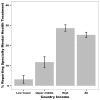Posttraumatic stress disorder in the World Mental Health Surveys
- PMID: 28385165
- PMCID: PMC6034513
- DOI: 10.1017/S0033291717000708
Posttraumatic stress disorder in the World Mental Health Surveys
Abstract
Background: Traumatic events are common globally; however, comprehensive population-based cross-national data on the epidemiology of posttraumatic stress disorder (PTSD), the paradigmatic trauma-related mental disorder, are lacking.
Methods: Data were analyzed from 26 population surveys in the World Health Organization World Mental Health Surveys. A total of 71 083 respondents ages 18+ participated. The Composite International Diagnostic Interview assessed exposure to traumatic events as well as 30-day, 12-month, and lifetime PTSD. Respondents were also assessed for treatment in the 12 months preceding the survey. Age of onset distributions were examined by country income level. Associations of PTSD were examined with country income, world region, and respondent demographics.
Results: The cross-national lifetime prevalence of PTSD was 3.9% in the total sample and 5.6% among the trauma exposed. Half of respondents with PTSD reported persistent symptoms. Treatment seeking in high-income countries (53.5%) was roughly double that in low-lower middle income (22.8%) and upper-middle income (28.7%) countries. Social disadvantage, including younger age, female sex, being unmarried, being less educated, having lower household income, and being unemployed, was associated with increased risk of lifetime PTSD among the trauma exposed.
Conclusions: PTSD is prevalent cross-nationally, with half of all global cases being persistent. Only half of those with severe PTSD report receiving any treatment and only a minority receive specialty mental health care. Striking disparities in PTSD treatment exist by country income level. Increasing access to effective treatment, especially in low- and middle-income countries, remains critical for reducing the population burden of PTSD.
Keywords: Epidemiology; International; Posttraumatic stress disorder (PTSD); trauma; treatment.
Figures
References
-
- Alhasnawi S, Sadik S, Rasheed M, Baban A, Al-Alak MM, Othman AY, Othman Y, Ismet N, Shawani O, Murthy S, Aljadiry M, Chatterji S, Al-Gasseer N, Streel E, Naidoo N, Mahomoud Ali M, Gruber MJ, Petukhova M, Sampson NA, Kessler RC. The prevalence and correlates of DSM-IV disorders in the Iraq Mental Health Survey (IMHS) World Psychiatry. 2009;8:97–109. - PMC - PubMed
-
- Andrews B, Brewin CR, Rose S, Kirk M. Predicting PTSD symptoms in victims of violent crime: the role of shame, anger, and childhood abuse. Journal of Abnormal Psychology. 2000;109:69–73. - PubMed
Publication types
MeSH terms
Grants and funding
LinkOut - more resources
Full Text Sources
Other Literature Sources
Medical



